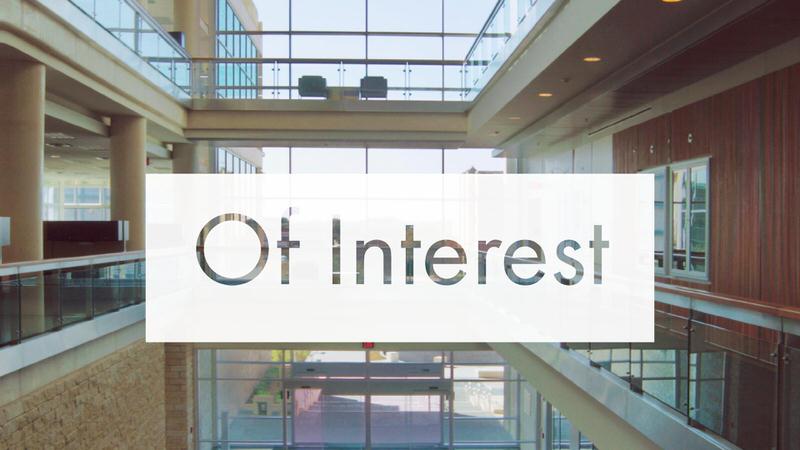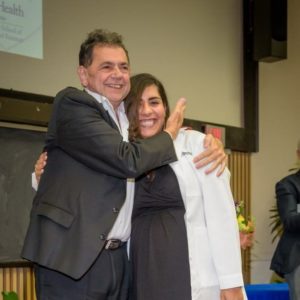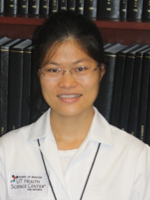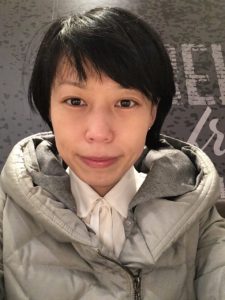Four Trainees Will Present at American Association of Immunologists (AAI) Annual Meeting

Four trainees in the Infection, Inflammation and Immunity (III) discipline of the Integrated Biomedical Sciences Ph.D. program and Department of Microbiology, Immunology and Molecular Genetics will make podium presentations in the upcoming American Association of Immunologists (AAI) Annual Meeting in Austin, Texas, May 4-8, 2018. These presentations, which highlight the cutting-edge progress of their respective field, are the result of the hard work by the trainees, as follows:
Allison K Hester
 Allison K Hester, a second-year Ph.D. student in Dr. Ann V. Griffith’s lab will present on Catalase expression mediates redox regulation of autophagy and promiscuous gene expression in thymic stromal cells. Allison was born and raised in Houston, TX. She graduated with her bachelor’s degree in Biology from Howard University, a historically black colleges and university, located in Washington, D.C. This will be her second poster presentation at AAI and her first oral presentation. In grad school, she has been awarded 3rd place poster presentation award for outstanding presentation at the 2017 Vaccine Development Center of San Antonio Conference. She has also been awarded the 2018 AAI trainee abstract award for the research that she will be presenting at AAI. She enjoys giving back to the San Antonio community and inspiring the youth to pursue science. She has participated in numerous science fairs and has partaken in a career day at Hawthorne Academy Middle School, encouraging and teaching middle school students the joys and perks of being a scientist. In 2017, she was awarded the Howard University Department of Biology Outstanding Alumnus award from her alma mater.
Allison K Hester, a second-year Ph.D. student in Dr. Ann V. Griffith’s lab will present on Catalase expression mediates redox regulation of autophagy and promiscuous gene expression in thymic stromal cells. Allison was born and raised in Houston, TX. She graduated with her bachelor’s degree in Biology from Howard University, a historically black colleges and university, located in Washington, D.C. This will be her second poster presentation at AAI and her first oral presentation. In grad school, she has been awarded 3rd place poster presentation award for outstanding presentation at the 2017 Vaccine Development Center of San Antonio Conference. She has also been awarded the 2018 AAI trainee abstract award for the research that she will be presenting at AAI. She enjoys giving back to the San Antonio community and inspiring the youth to pursue science. She has participated in numerous science fairs and has partaken in a career day at Hawthorne Academy Middle School, encouraging and teaching middle school students the joys and perks of being a scientist. In 2017, she was awarded the Howard University Department of Biology Outstanding Alumnus award from her alma mater.
Tell me about your research project and what you will be presenting at AAI?
My research project involves using differential gene expression mapping to studying redox regulation of thymus function. At AAI I will be presenting data that support the idea that oxidative stress generated by low catalase levels in thymic stromal cells promotes key physiological functions in the young, steady state thymus by promoting negative selection of potentially auto-reactive T cells. The study uses thymic stromal cell transcriptome analysis to study the mechanisms by which oxidative stress may promote the expression of what are called “tissue-restricted antigen” genes, and also explores the influence of oxidative stress on the autophagy pathway in stromal cells. Tissue-restricted antigen expression and autophagic flux in stromal cells are required for self-antigen presentation, and therefore promote negative selection of potentially auto-reactive T cells. This helps to establish self-tolerance in the T cell population.
Why is your research important?
Establishing self-tolerance in the T cell population is important in preventing autoimmune disease. T cells that are developing in the thymus can recognize a very broad range of antigens, which is beneficial in terms of recognizing new pathogens, but could also result in generation of T cells that would mount an autoimmune response. To prevent that, stromal cells in the thymus present self-antigens to T cells, and if a T cell recognizes self-antigens strongly, it is signaled to die. To promote tolerance to all peripheral tissues, for instance, the pancreas, stromal cells in the thymus express genes that are normally expressed in just a few tissues (for instance, insulin). There is still a lot that is unknown about how the expression of those types of genes, which are typically silenced in most tissues, is selectively up-regulated in the thymus. My research explores some novel potential mechanisms regulating that self-antigen expression and presentation that is critical for preventing autoimmunity. Understanding the mechanisms that promote TRA expression and autophagic flux in thymic stromal cells could ultimately translate into therapies for individuals with autoimmune disease.
Why are you excited to present at AAI?
I am extremely excited to present at AAI because it allows me to contribute to and learn about the most recent advances within the field of immunology. Presenting my research at AAI will allow me to present my most up-to-date findings and receive feedback from colleagues whom may provide pertinent information toward my research. Additionally, I am eager to advocate for the field of immunology. As a scientist I feel it is very important that we share our research findings with individuals to increase visibility of our research and provide interested individuals with more information. Presenting at AAI will also allow me to develop the expertise needed to discuss and answer specific questions about my research in a clear and meaningful way to a range of individuals.
Helia N. Sanchez
 Helia N. Sanchez, a fourth-year Ph.D. student in Dr. Paolo Casali’s lab will present on “B cell-intrinsic epigenetic modulation of local and systemic antibody response by gut microbiota through catabolic short-chain fatty acids.” She obtained a bachelor’s of science from The University of Texas at San Antonio. She has been selected for podium presentations at AAI in 2016 and 2018 as well as San Antonio Vaccine Conference in 2015, 2016 and 2017. She is also a representative in the IBMS Student Council. She was also honored to be named “Best Ph.D. Student of the Year” in the Department of Microbiology, Immunology and Molecular Genetics in 2016. She has received travel awards from AAI and the MIMG Department, and won the first prize in the poster presentation in our department retreat.
Helia N. Sanchez, a fourth-year Ph.D. student in Dr. Paolo Casali’s lab will present on “B cell-intrinsic epigenetic modulation of local and systemic antibody response by gut microbiota through catabolic short-chain fatty acids.” She obtained a bachelor’s of science from The University of Texas at San Antonio. She has been selected for podium presentations at AAI in 2016 and 2018 as well as San Antonio Vaccine Conference in 2015, 2016 and 2017. She is also a representative in the IBMS Student Council. She was also honored to be named “Best Ph.D. Student of the Year” in the Department of Microbiology, Immunology and Molecular Genetics in 2016. She has received travel awards from AAI and the MIMG Department, and won the first prize in the poster presentation in our department retreat.
Tell me about your research project and what you will be presenting at AAI?
My research focuses on the molecular mechanisms underlying the antibody response and regulation of such response by the gut microbiota. Immunoglobulin class-switch DNA recombination (CSR) and somatic hypermutation (SHM), as initiated by a DNA deaminase AID, and plasma cell differentiation, as mediated by the transcription factor Blimp-1, are critical for the maturation of antibody responses. At AAI 2018, I will be sharing our current findings showing that gut microbiota modulates CSR/SHM and plasma cell differentiation through production of metabolites short chain fatty acids (SCFAs), such as butyrate and propionate. SCFAs are major metabolic products generated by gut microbiota through processing of dietary fibers. As we have discovered, they effectively dampen local and systemic IgG, IgA and IgE responses by reducing AID and Blimp-1 expression in B cells and, therefore, CSR/SHM and plasma cell differentiation. Consequently, SCFAs virtually abrogate the allergic IgE response to house dust mite and peanut as well as the IgG autoantibody response in a lupus mouse model. Conversely, mice fed fiber-free diets have reduced levels of gut SCFAs and, concomitantly, increased titers of serum IgG, IgA, and IgE. We have further shown that SCFAs reduce AID and Blimp-1 expression by upregulating the expression of microRNAs that can silent the expression of genes encoding AID or Blimp-1.
Why is your research important?
Our research has provided a paradigmatic example of how the core mechanisms of B cell differentiation and antibody responses can be modulated by gut microbiota through B cell-intrinsic epigenetic mechanisms. It also unveiled an integrated regulatory network involving microbiota, metabolites, B cells and microRNAs and suggested that components of such a network can be potential therapeutics or therapeutic targets to treat allergy and autoimmune diseases.
Why are you excited to present at AAI?
The American Association of Immunologists (AAI) is an association which gathers professionally trained scientists from all over the world dedicated to advancing the knowledge of immunology and its related disciplines. The AAI annual conference provides a platform on which cutting edge research and ideas are shared among immunologists worldwide. The symposium also addresses the potential integration of immunologic principles into clinical practice. Also, as I am currently preparing a manuscript for publication, it would be particularly beneficial for me to present my work and receive feedback from my peers and experts in the field. Finally, attending this conference is not only a great educational opportunity but it is also a great place to network and meet other investigators for collaboration and future postdoctoral positions.
Huoqun Gan
 Huoqun Gan, an exchange student from the Xiangya School of Medicine in China, in Dr. Paolo Casali’s lab will present on “Sirt1-mediated metabolic modulation of Aicda, class-switch DNA recombination and somatic hypermutation.” Gan is a student in the 9-year medical program in the Xiangya School of Medicine, Central South University, in China. This is a highly competitive and rigorous training program that offers the the bachelor degree at the end of the Sixth year, support trainees to go to U.S. for two-year research training in a prestigious institution in Year 7 and Year 8, and confers the M.D. degree at the end of the Year 9. Gan has been conducting research, as part of the Xiangya-UT Long School of Medicine Joint Research Program, in Dr. Casali’s lab since July 2016. She has been selected for podium presentations at AAI in 2018 as well as San Antonio Vaccine Conference in 2017. I have recently been awarded the Second Prize at Passport Poster Day of the Long School of Medicine.
Huoqun Gan, an exchange student from the Xiangya School of Medicine in China, in Dr. Paolo Casali’s lab will present on “Sirt1-mediated metabolic modulation of Aicda, class-switch DNA recombination and somatic hypermutation.” Gan is a student in the 9-year medical program in the Xiangya School of Medicine, Central South University, in China. This is a highly competitive and rigorous training program that offers the the bachelor degree at the end of the Sixth year, support trainees to go to U.S. for two-year research training in a prestigious institution in Year 7 and Year 8, and confers the M.D. degree at the end of the Year 9. Gan has been conducting research, as part of the Xiangya-UT Long School of Medicine Joint Research Program, in Dr. Casali’s lab since July 2016. She has been selected for podium presentations at AAI in 2018 as well as San Antonio Vaccine Conference in 2017. I have recently been awarded the Second Prize at Passport Poster Day of the Long School of Medicine.
Tell me about your research project and what you will be presenting at AAI?
My project focus on the role of Sirt1, a Class III histone deacetylase (HDAC) that requires nicotinamide adenosine dinucleotide (NAD+) as a cofactor, in B cell differentiation and the antibody response – Class I, II and IV HDACs all require Zn2+ as the co-factor. At AAI, we will present our recent findings that Sirt1 plays a major role in controlling the expression of AID, which is encoded by the Aicda gene and is a DNA cytidine deaminase critical for antibody class switch DNA recombination (CSR) and somatic hypermutation (SHM), two B cell differentiation processes underpinning the maturation of the antibody response. B cells undergoing CSR/SHM profoundly downregulate Sirt1. Sirt1 gene ablation in activated B cells leads to increased high-affinity IgG antibodies in response to NP-CGG, as a result of upregulated AID expression. We have also shown that upregulated AID expression in Sirt1-deficient B cells is due to increased acetylation of both histone proteins and non-histone proteins, e.g., NF-kB. Conversely, NAD+ and SRT1720, small molecule Sirt1 activator, dampens Aicda expression and CSR. Finally,consistent with a major role of Sirt1 in regulating glucose metabolism, increased glucose concentrations reduces NAD+ levels and Sirt1 activity, resulting in hyperacetylated NF-kB and AID upregulation.
Why is your research important?
Our findings have outlined an important B cell-intrinsic role of Sirt1, a protein that is at the crossroad of cell metabolism (glucose/NAD) and gene expression (Aicda), in the modulation of the antibody response. As we have also recently found, the Sirt1 expression and activity are dysregulated in both lupus patients and mouse models of lupus, suggesting that Sirt1 plays an important role in autoimmune diseases related to class-switching and can be explored towards the development of new lupus therapeutics. This possibility is even more plausible due to the availability of small molecule compounds that have already been developed to modulate Sirt1 activities with high specificity and potency and low toxicity.
Why are you excited to present at AAI?
This is going to be my first time in making a podium presentation at AAI (I did a poster presentation last year in AAI 2017 held in Washington D.C.). I am looking forward to sharing our exciting research findings and making new friends as possible future collaborators. It is also a good opportunity for me to gain presentation skills, which is particularly important, as I will make similar presentations for my job interviews next year in China.
Dr. Hui Yan
 Dr. Hui Yan, a post-doctoral fellow in Dr. Paolo Casali and Dr. Zhenming Xu’s lab will present on “B lymphocytes are a major source of IL-27 that drives class-switched antibody responses and anti-viral immunity through paracrinic targeting of B cells and T follicular helper cells.” Dr. Yan earned a Medical degree and a Master’s degree in Biochemistry and Molecular Biology from the Xuzhou Medical College in China before she came to U.S. for the Ph.D. studies in the East Tennessee State University (ETSU). After graduation in 2016, she joined the Antibody Laboratory in the Department of Microbiology, Immunology and Molecular Genetics as a post-doctoral fellow under the mentorship of Dr. Zhenming Xu. She has received several travel awards, as both a graduate student and a post-doc, and a graduate student research grant in ETSU.
Dr. Hui Yan, a post-doctoral fellow in Dr. Paolo Casali and Dr. Zhenming Xu’s lab will present on “B lymphocytes are a major source of IL-27 that drives class-switched antibody responses and anti-viral immunity through paracrinic targeting of B cells and T follicular helper cells.” Dr. Yan earned a Medical degree and a Master’s degree in Biochemistry and Molecular Biology from the Xuzhou Medical College in China before she came to U.S. for the Ph.D. studies in the East Tennessee State University (ETSU). After graduation in 2016, she joined the Antibody Laboratory in the Department of Microbiology, Immunology and Molecular Genetics as a post-doctoral fellow under the mentorship of Dr. Zhenming Xu. She has received several travel awards, as both a graduate student and a post-doc, and a graduate student research grant in ETSU.
Tell me about your research project and what you will be presenting at AAI?
I have two large ongoing projects, which focus on physiological and pathological functions of B lymphocytes. The findings I will be presenting at AAI 2018 focus on the immune regulatory function of B cells, particularly through production of IL-27, a pleiotropic cytokine that function on multiple immune cells (I presented in last year’s AAI annual meeting the role of small GTPase Rab7 in B cell lymphomagenesis). In Austin, I will talk about our discovery that B cells are a major source of IL-27 and B cell-produced IL-27 critically controls the IgG2a antibody response and the anti-viral immunity. I will also share the insights we have had so far on the molecular and cellular mechanisms underlying how B cells produce IL-27 and how IL-27, in turn, functions on a different B cell subset to promote class-switching in a paracrine manner. Finally, I will present preliminary findings that B cells and T follicular helper cells reciprocally enhance their production of IL-27 and IL-21 for optimal B cell differentiation and the antibody response.
Why is your research important?
In addition to revealing a new regulatory mechanism governing the antibody response, my research expands the concept that B cells are much more than antibody-producing cells, as they are also important immune regulatory cells. Due to the pleotropic functions of IL-27, B cells would also exert their regulatory functions in many different physiopathological contexts beyond the vaccine development and the anti-viral immunity. For instance, we have started to explore the role of B cells and B cell-produced IL-27 in breast cancer tumor development, as prompted by the high expression of the IL-27 receptor genes in the breast and the worst survival of breast cancer patients who express high levels of IL-27.
Why are you excited to present at AAI?
I am excited to share our findings with experts in the cytokine field and the T follicular helper cell field as well as editors from major immunology journals, and hope to get their feedback prior to the preparation of our manuscript. For me, it is also a good opportunity to practice my presentation skills and expand my network.
